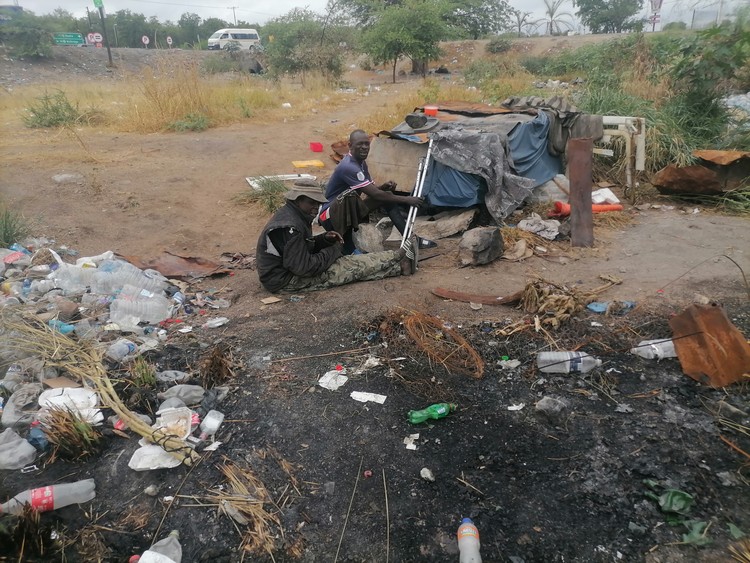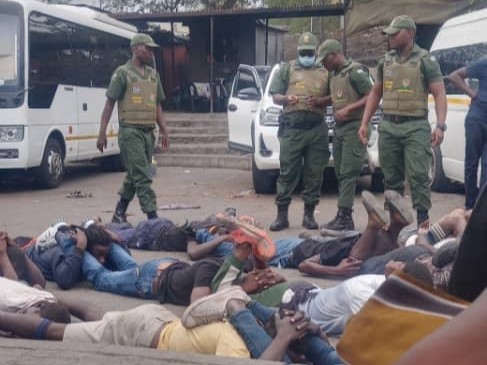Traders accuse border officers of beating them and burning their stalls
Lawyers for Human Rights accuse authorities of violating human rights
These informal traders are among those who accuse the Border Management Authority of beating them and burning their items before many of them were deported to Zimbabwe. Photo: Bernard Chiguvare
- Informal traders are accusing Border Management Authority (BMA) officials at Beitbridge Border in Limpopo of beating them and burning their belongings.
- BMA has denied the allegations.
- The Zimbabwean traders acknowledge that they were undocumented at the time.
- Lawyers for Human Rights condemned the actions by BMA officers, calling it unlawful and a violation of basic human rights.
Informal traders are accusing Border Management Authority (BMA) officials at Beitbridge Border in Limpopo of beating them and burning their belongings. The Zimbabwean traders acknowledge that they were undocumented at the time.
Lawyers for Human Rights condemned the actions by BMA officers against the hawkers at the Beitbridge border, calling it unlawful and a violation of basic human rights.
We spoke to traders who sell sweets and fruit at the port of entry. They claim that a week before Easter weekend, BMA officers came to their stalls, demanding to see their documents. When they could not produce them, they were hit, forced to lay face-down on the ground and their small wooden stalls were set alight.
The traders have been selling their goods at the border from a few months to as long as five years.
“This sort of treatment is very different from what police and soldiers do. They do not beat us or burn our stuff. Instead, we are bundled and taken to Musina police station then later deported,” said a 37-year-old trader who also takes goods from South Africa to Zimbabwe for a fee.
Another trader, who only identified herself as Chiedza, said she was one of the people beaten and arrested then later deported to Zimbabwe. Chiedza has been coming to Beitbridge, on the South African side, since 2020 to sell assorted fruit.
She has two children who live alone and attend school in Zimbabwe on the days she sells her produce at the border. “To be honest I quickly informed them that I had no passport. A female BMA slapped and beat me using her black boots. Several of us were taken to an office at the border. We were all ordered to stand with hands grabbing our heads. They came again beating us then bundled us into a police van to Musina Police station,” she said.
Chiedza told GroundUp that she was among 20 people arrested and deported that day. “The money I make from selling food, pays for school fees and rent.”
Mmemme Mogotsi, deputy assistant commissioner and spokesman for the BMA, denied the allegations.
Border Management Authority officials checking the documents of traders at Beitbridge Border in Limpopo last month. Photo supplied
Mogotsi told GroundUp that the traders needed to prove that it was in fact the BMA authorities who conducted the raid. GroundUp was sent a photograph from a witness clearly showing BMA officers standing around a group of men on the ground, face down, with their hands behind their backs.
“The BMA has and continues to uphold the fundamental human rights that apply to every traveller through our ports, regardless of their nationality or immigration status. Our staff and Border Guards are well trained and sensitive to human rights and protocols,” said Mogotsi.
She added that it was the responsibility of the traders to “be in the country legally and uphold the laws of the country”.
But Tumelo Mogale, a legal counsellor at Lawyers for Human Rights, told GroundUp that BMA does not have the powers “to assault nor burn properties of any person within the Republic of South Africa”.
“The correct procedure must be followed by BMA officials, as one of their responsibilities is immigration control. They can ask any person to identify themselves or ask for their documentation. If the person is undocumented, then the BMA officials are authorised to arrest that person and hand them to Immigration officers or to SAPS,” he said.
“Nowhere in the law are SAPS, Immigration officers and BMA officials allowed to assault any person regardless of whether the person is documented or undocumented,” he said.
Beitbridge economy
The informal traders are an essential part of the Beitbridge economy. They are selling vital goods for low-income people, many of whom are crossing the border one way or another, and have to wait for hours. The border is also loosely guarded. So some of the traders, like the Zimbabwean woman whose children go to school in Zimbabwe, possibly crosses the border regularly without documents, quite easily.
This has been going on for years. To suddenly use strong-arm tactics against the traders ignores the facts that they are a critical part of the economy and that the border is, through no fault of theirs, porous.
Support independent journalism
Donate using Payfast

Don't miss out on the latest news
We respect your privacy, and promise we won't spam you.
Next: Benoni’s elderly march for electricity
Previous: Elections 2024: What the major political parties say about education
© 2024 GroundUp. This article is licensed under a Creative Commons Attribution-NoDerivatives 4.0 International License.
You may republish this article, so long as you credit the authors and GroundUp, and do not change the text. Please include a link back to the original article.
We put an invisible pixel in the article so that we can count traffic to republishers. All analytics tools are solely on our servers. We do not give our logs to any third party. Logs are deleted after two weeks. We do not use any IP address identifying information except to count regional traffic. We are solely interested in counting hits, not tracking users. If you republish, please do not delete the invisible pixel.


